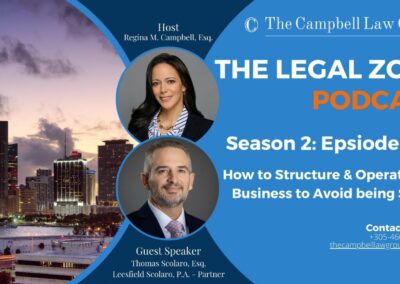La creación de relaciones puede llevar años, al igual que el desarrollo de sus secretos comerciales más importantes, mientras que la destrucción de estos elementos de su negocio puede ocurrir en un instante. Del mismo modo, un acuerdo comercial puede llevar meses e incluso años de planificación para llegar a buen puerto, mientras que la interferencia intencionada de terceros puede detener un acuerdo de la noche a la mañana. Cuando entidades externas actúan para perjudicar la fortuna económica de su empresa mientras enriquecen la suya propia en el proceso, son causantes de daños y perjuicios. interferencia ilícita con una relación comercial ventajosa.
Hay ciertas facetas de la interferencia ilícita que deben demostrarse para litigar con éxito. El demandante debe poder demostrar la existencia de una relación comercial o económica ventajosa o potencial de la que el causante tenía conocimiento. El demandante también debe demostrar que el causante del daño intervino intencionada e injustificadamente en contra de la relación pendiente o posible entre su empresa y otro cliente o empresa (como un vendedor o proveedor, una entidad comercial que estaba considerando comprar, una empresa que estaba considerando fusionarse, etc.). Y, por último, la acción del causante del perjuicio tiene que haber causado daños a su empresa. En la mayoría de los casos, la interferencia ilícita del causante debe ser intencionada para que usted pueda cobrar daños y perjuicios y debe incluir algún tipo de acto ilícito (como el uso indebido de información confidencial que el causante utiliza para interferir con sus clientes o relaciones beneficiosas).
Litigar contra la interferencia ilícita en una relación comercial ventajosa requiere una representación legal agresiva bien versada en la ley de responsabilidad civil de Florida y con amplia familiaridad en la presentación de casos de interferencia ilícita en los tribunales de Florida.
Nuestra firma tiene la experiencia y los recursos para construir un caso sólido y litigar una acción de interferencia ilícita en su nombre. La experiencia es importante. Su empresa se beneficiará de un bufete de abogados capaz de anticiparse a los argumentos de la parte contraria en este tipo de casos. Ya sea redactando contratos, negociando o litigando, nuestro objetivo es anticiparnos a cualquier posible problema que pueda dejar al margen a nuestro cliente y abordarlo de forma proactiva.
Si cree que alguien ha interferido torticeramente en sus relaciones comerciales en el estado de Florida, Campbell Law Group puede ayudarle a detener la interferencia y a recuperar los daños y perjuicios a los que tiene derecho.
The Campbell Law Group: Representación legal experta en casos de interferencia perjudicial
Para perseguir casos de interferencia perjudicial, es esencial buscar el asesoramiento de un abogado que posea experiencia en asuntos jurídicos y litigios empresariales complejos. Es aún mejor si el abogado entiende la dinámica empresarial y tiene experiencia financiera. En Campbell Law Group, estamos especializados en litigios empresariales complejos y tenemos experiencia en litigios que implican implicaciones transfronterizas y cuestiones jurisdiccionales.
Nuestra firma acepta casos de todo el sur de la Florida, como Miami Beach, Coral Gables, Coconut Grove, South Miami, Pinecrest, Brickell, Edgewater, Doral, y Wynwood, así como casos en Broward y Palm Beach County, Tampa, Orlando, y el resto de la Florida. Póngase en contacto con nosotros para obtener más información sobre cómo nuestra empresa puede ayudarle.
Preguntas frecuentes
¿Cuáles son los elementos para que prospere una demanda por interferencia ilícita en una relación comercial ventajosa en Florida?
Para que prospere una demanda por interferencia torticera en una relación comercial ventajosa en Florida, el demandante debe demostrar que:
- Existía una relación comercial que proporcionaba un beneficio económico al demandante
- El demandado conocía la relación comercial y su beneficio económico para el demandante
- El demandado interfirió intencionadamente en la relación comercial sin justificación
- La interferencia causó daños o perjuicios al demandante
¿Cuáles son algunos ejemplos de interferencia ilícita en una relación comercial ventajosa?
Hay varios casos que pueden considerarse interferencia ilícita en una relación comercial ventajosa en Florida. Estos incluyen, pero no se limitan a:
- Inducir a un cliente a poner fin a una relación comercial con el demandante
- Difusión de información falsa sobre el demandante a clientes o proveedores
- Amenazar a un tercero que hace negocios con el demandante
- Interferir en el negocio del demandante interrumpiendo su cadena de suministro o su proceso de producción.
- Utilizar información confidencial obtenida del demandante para obtener una ventaja competitiva
- Robar clientes o empleados al demandante
- Presentar demandas o reclamaciones administrativas frívolas contra el demandante.
- Causar intencionadamente un perjuicio económico al demandante
- Chantajear al demandante o utilizar tácticas de extorsión para interferir en sus relaciones comerciales.
- Realizar prácticas de competencia desleal contra el demandante.
¿Qué defensas pueden oponerse a una demanda por interferencia ilícita en una relación comercial ventajosa?
Algunas de las defensas que pueden oponerse a una demanda por interferencia torticera en una relación comercial ventajosa en Florida incluyen:
- Justificación: Esta podría ser una defensa válida si el demandado tuviera una razón comercial o legal válida para interferir en la ventajosa relación comercial del demandante.
- Consentimiento: Esta podría ser una defensa si el demandante consintió las acciones del demandado que supuestamente interfirieron en la relación comercial ventajosa.
- Falta de causalidad: Si las acciones del demandado no causaron realmente un perjuicio económico al demandante ni interfirieron en su relación comercial, ésta podría ser una defensa.
- Primera Enmienda: En algunos casos, las acciones del acusado pueden estar protegidas por la Primera Enmienda, como cuando el discurso del acusado se considera opinión o comentario sobre un asunto de interés público.
Es importante tener en cuenta que la disponibilidad y el éxito de estas defensas pueden variar dependiendo de las circunstancias específicas del caso, y lo mejor es consultar con un abogado con experiencia para obtener orientación.
¿Qué daños y perjuicios pueden solicitarse en una demanda por interferencia ilícita en una relación comercial ventajosa?
En una demanda por interferencia ilícita en una relación comercial ventajosa, un demandante puede solicitar daños y perjuicios que incluyan pérdidas económicas, como lucro cesante u oportunidades de negocio, así como daños y perjuicios no económicos, como daños a la reputación del demandante o pérdida de fondo de comercio.





